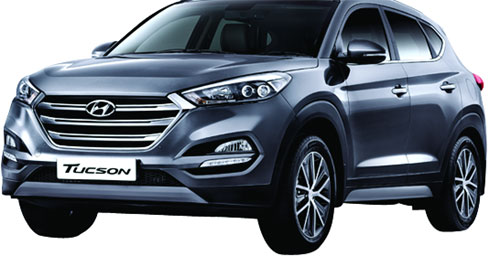After the Supreme Court and NGT’s strictures against diesel vehicles, does it make sense to buy a big petrol SUVIJ We take a look at the economics with the Hyundai Tucson
The Hyundai Tucson has been on the market for around six months and the SUV finds itself button-holed between its stablemates, the Creta and the Santa Fe. Personally, I feel a large five-seater SUV makes more sense than buying an overly large seven-seat SUV unless you have the needs for a much larger car, at which point one should simply ask themselves, “Why not an InnovaIJ”
During the first drive of the Tucson, I drove the car up from Chandigarh to Kasauli and found that it was a fabulous car to drive and like all modern Hyundais, was a blend of good looks, creature comforts inside and easy driving and handling characteristics. But during the first drive, I drove the Diesel Automatic GlS variant. During the past week in the city, I have spent a lot of time driving the “NU” two-litre petrol engined variant which has the same engine as the Elantra, which is a car I really like, especially because of its ventilated seats, which Hyundai should install on all their premium products.
But coming back to the petrol versus diesel argument. When it comes to the Elantra or its rivals in that segment such as the Corolla or Octavia, I would have no hesitation in recommending a petrol variant. A sedan after all drives lower, has better centre of gravity, therefore handles better and is inherently more aerodynamic, so fuel economy isn’t heavily compromised. Of course, a sedan does not make great use of its footprint, which is why I feel India is ripe for a few good estates.
Simply put, the Tucson and Elantra share the same engine, but the Elantra is more economical in real-world driving conditions. The Tucson delivered, according to its own computer, a fuel economy of 7.7 kilometres per litre in city conditions with very soft driving. The Elantra, which I drove around a year ago, gave me just over 10 kilometres per litre. But when it comes to the Tucson diesel, which thanks to its turbocharger has 185PS versus the petrol’s 155PS, delivered close to 11 kilometres a litre when I drove late last year. Of course, that was primarily on highways, albeit hilly highways. In real-world urban conditions, the Tucson diesel can be reliably estimated to deliver at least 10 kilometers per litre.
So when it comes to power and economy, the Tucson diesel has more — 20 per cent more power and at least 25-30 per cent more fuel economy. That should be that then, the diesel should be the logical choice. But these are not the only two factors. The price difference between the Gl-specification automatic variants of the Tucson is Rs 1.6 lakhs between the petrol and diesel at ex-showroom prices. A difference that near as makes no difference is close to two lakhs on-road. So if your drive is around 30-40 kilometres a day on average for a maximum of around 1,000 kilometres a month, you will spend on average of only Rs 3,000 more for a petrol car over a diesel car. In over five years you just about break even over the two variants (if the price difference remains around Rs 10). Of course, if you drive significantly more, the numbers are clearly in favour of diesel.
And then there is the other factor; the Supreme Court last year said that all diesel vehicles over ten years of age cannot be driven on NCR roads. This order is almost guaranteed to become stricter nationwide when the pollution levels get worse this winter (and next) and the courts and NGT consider the dramatic actions being taken against diesel vehicles in Europe. This means that diesel vehicles have dramatically accelerated depreciation compared to their petrol counterparts.
So not only do you pay more, but you will get a lot less when you sell the car on, and if you sell the car on after six-seven years, you will get very little. Just go to any second-hand car market and find out. After five years, you might have made up the price difference on fuel costs, and this assumes that maintenance costs are similar, but then discover that when you go to sell the car, you are still in a hole because the petrol variant has held its value better. Simply because it still has ten years of life left versus five for the diesel.
And there is something else. While diesel engines have made tremendous improvements, albeit some of it relating to pollution now seems dubious, they still sound horrible and aren’t as smooth as a petrol car. So, yes, even on an SUV, buying petrol makes sense.
And as for the Tuscon petrol, well, I really liked it. Easy to drive and you don’t miss the extra power of the diesel because the power comes on better in the petrol. And I’m glad that Hyundai offers a petrol variant on the Tucson.


























